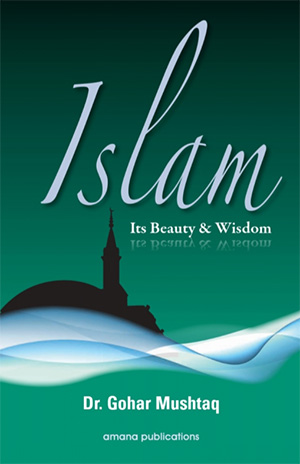Hub For Your Daily Islamic Insights 🕋 🕌

Islam: Its Beauty & Wisdom, A thoughtful exploration of the principles and values of Islam
A thoughtful exploration of the principles and values of Islam
Free
Discover the profound beauty and wisdom of Islam with this enlightening book by Dr. Gohar Mushtaq. 'Islam: Its Beauty & Wisdom' offers readers a clear and captivating introduction to the core teachings and spiritual insights of the Islamic faith. Published by amana publications, this thoughtfully written volume is perfect for both newcomers and those looking to deepen their understanding. Ideal for personal study or as a thoughtful gift, this paperback edition features a contemporary, easy-to-read format, typically sized at 6 x 9 inches. Engage with faith, philosophy, and inspiration through a book designed to enrich your knowledge and perspective.
Islam, one of the world’s major religions, is often approached through the lenses of culture, politics, and conflict. However, a thoughtful exploration of Islam reveals a rich tapestry of beauty and wisdom embedded in its principles and values. This exploration does not just serve to illuminate the faith itself; it cultivates a deeper understanding of human connection, ethics, and communal harmony. ### The Core Principles of Islam At the heart of Islam is the concept of Tawhid, the oneness of God. This foundational belief asserts that God is unique, without partners or equals. Tawhid transcends mere doctrine; it shapes the worldview of Muslims, imbuing life with purpose and direction. The recognition of a singular divine authority fosters a profound sense of responsibility, urging believers to lead lives of integrity while nurturing accountability towards one another and the creation. ### The Five Pillars of Islam: A Framework for Living The Five Pillars of Islam—Shahada (faith), Salah (prayer), Zakat (charity), Sawm (fasting), and Hajj (pilgrimage)—form the practical framework that guides a Muslim's daily existence. Each pillar encapsulates essential teachings that illustrate the beauty of the faith: 1. **Shahada**: The declaration of faith is a profound affirmation of belief that emphasizes the importance of sincerity and intention in one’s journey toward spiritual fulfillment. It indicates not just faith in God, but also a commitment to justice, compassion, and community. 2. **Salah**: The practice of daily prayers interweaves moments of reflection, humility, and gratitude throughout the day. It fosters a personal connection to God, encourages discipline, and cultivates a sense of belonging within the global Muslim community. 3. **Zakat**: The principle of charity reinforces the idea that wealth is a trust and should be shared for the betterment of society. Zakat promotes economic justice and social stability, reminding believers of their responsibility towards the less fortunate. This act cultivates empathy and generosity, reflecting the beauty of human connection. 4. **Sawm**: The month of Ramadan, during which Muslims fast from dawn until dusk, is a transformative experience that builds self-discipline, fosters spiritual reflection, and encourages gratitude. The shared experience of fasting strengthens ties within communities and offers an opportunity to empathize with those in need. 5. **Hajj**: The pilgrimage to Mecca is a once-in-a-lifetime obligation for those who are physically and financially able. Hajj represents unity among Muslims worldwide, transcending cultural and national boundaries. It is a journey marked by profound spiritual awakening and a commitment to equality and humility. ### The Values of Islam: Compassion and Justice One of the most significant aspects of Islam is its emphasis on compassion. The Quran and Hadiths (teachings of the Prophet Muhammad) consistently advocate for mercy, kindness, and the importance of nurturing relationships. The practice of compassion in Islam is not limited to fellow believers; it extends to humanity as a whole and even to the environment, promoting a holistic ethic of care. Justice is another fundamental tenet that is intricately woven into the fabric of Islamic teaching. The Quran repeatedly calls for fairness in personal and social conduct, insisting that justice be upheld unwaveringly—"O you who have believed, be persistently standing firm in justice, witnesses in testimony for the sake of Allah, even if it be against yourselves or parents and relatives" (Quran 4:135). Such assertions serve as a call to action for Muslims to advocate for social justice, peace, and equitable treatment. ### The Importance of Knowledge Islam places a high value on knowledge and education, encouraging believers to seek wisdom and understanding. Both the Quran and the sayings of the Prophet Muhammad emphasize that knowledge is integral to faith and practice. This importance of education extends beyond religious teachings; it encourages critical thinking, inquiry, and an earnest pursuit of truth. Scholars throughout Muslim history have contributed greatly to various fields, from the sciences to the arts, embodying the Islamic value of knowledge. ### The Role of Community and Family Community and family are cornerstones of Islamic life. The Quran emphasizes the importance of brotherhood and cooperation among individuals, highlighting that believers are like a single body; when one part suffers, the rest feel the pain. This principle nurtures a sense of belonging and shared responsibility, fostering environments where care and support flourish. Family, too, holds a sacred place in Islam. The family unit is seen as a foundation for society; it is within the family that values are taught, love is nurtured, and the next generation is raised. Respect for parents, the importance of marital relationships, and the rights of children are emphasized throughout Islamic teachings, reflecting the intrinsic beauty of familial bonds. ### Interfaith Dialogue and Understanding In today’s world, where division and misunderstanding often dominate, Islam invites believers to engage in interfaith dialogue and mutual respect. The Quran acknowledges the diversity of religious beliefs, advocating for coexistence and understanding among different faiths. Muslim teachings encourage fostering goodwill, promoting peace, and emphasizing shared values that unite humanity, such as compassion and justice. ### Conclusion: A Call for Reflection As we explore the beauty and wisdom of Islam, it becomes evident that the principles and values embedded in this faith offer profound insights not only for Muslims but for all of humanity. The emphasis on compassion, justice, community, and knowledge resonates deeply in a world that often seems fragmented. Islam's teachings challenge us to reflect on our actions, to cultivate ethical living, and to build bridges of understanding across divides. As we navigate our individual and collective journeys, let us embrace the beauty and wisdom that Islam embodies, fostering a world defined by peace, respect, and mutual regard.
